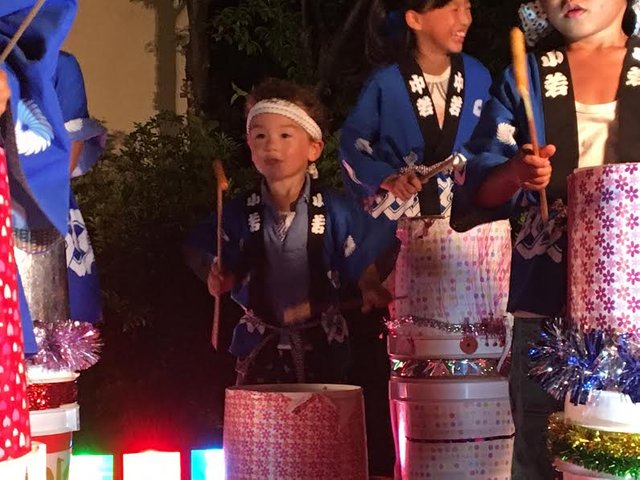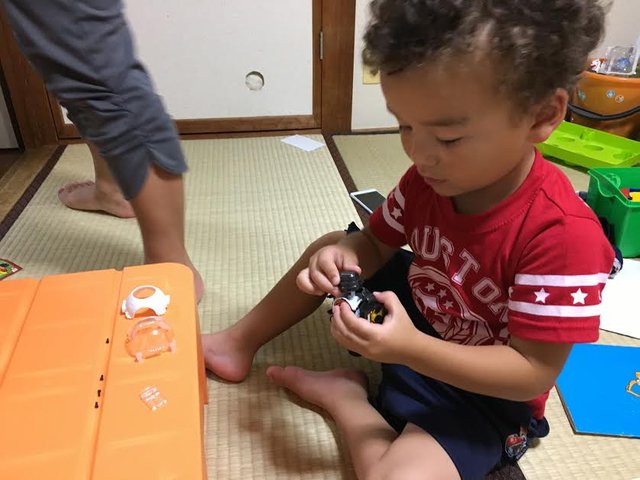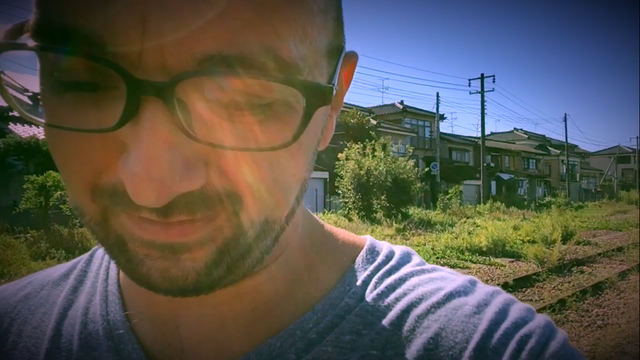
I have some experience working with children. I studied Elementary Education in university, and have been in and out of public schools (both in America and Japan), music schools, and after school clubs for the past 10 years or so. Kids have always liked me. I have always liked them, and their bright and open way of viewing the world. Now I have one of my own.
The core lesson for any peaceful parent is this: have peace inside of yourself, first. My friend and somewhat of a parenting mentor @boxcarblue wrote about this after reading about the peaceful parenting movement. If you don't have peace, if you are not clear-headed, you won't be able to meet and deal with a lack of peace in your children, or anyone else for that matter. Of course this may sound like a tall order, and I can tell you from experience that it is. It takes work. It takes work, but more than anything, it takes awareness, and flexibility.
Your child is a human being. Big shock, right? Well, actually for many parents it is. Up until now, people--especially older generations--have been raised to believe that children should "be seen and not heard" and should simply obey their parents requests, orders, and instructions without question, complaint, or protest. I was raised this way. Let me tell you, it will ALWAYS backfire. As an example:
When I was a child, my father tried to do his best to raise me as a "good boy" so I would not "go down the path of sin" and, truth be told, mostly so I would not annoy him or anyone else, because that would have embarrassed him, and he would have felt humiliated. He was extremely strict and demanding, and because of this, I was not allowed the normal and natural expression in childhood which is so vital to the healthy development of human beings. My parents always used to tell me how "good I was in restaurants" and how they could take me out ANYWHERE, while their friends couldn't go out because their kids were "brats." Well, sad to say, the reason I was "good" was more likely because I was petrified of getting beaten with a leather belt and exiled from my father's affections. I am not sure I had much of a natural, "childlike interest" in table manners.
One "wrong" move, one word, one action, and that was it. Dad was enraged, and I, even in diapers, was having my body violated and being humiliated for whatever normal thing (read "grave and unforgivable sin") I had done. How can a child understand this? Why did my father do it to me? As you can probably guess, his father--my granddad--was even worse, and so on and so forth back in time. The takeaway is this:
If you were not allowed to express your emotions as a child you will not be able to receive the emotional expression of your children.
Nobody extended that love to you, thus your capacity to extend it to others is compromised. I can still feel the rage building up inside sometimes when my son is screaming, crying, or stomping on the floor. Why? Because I was never allowed that expression! I had to "tough it out!" Why shouldn't everyone else??? You see, there is a wound here, and it must be healed if we are ever going to reach our children.
How to handle a tantrum:
Take a deep breath
Take a second to step back and assess your own emotions. How do I feel right now. Why? What about this tantrum is annoying or disturbing me so much? Am I tired, scared, nervous or worried about something else that is happening in my life, not related to this tantrum? When we have other things weighing on our minds, we lose the "bandwidth" needed to extend compassion to others.Ask why
Why is my son crying? Why is my son screaming? Is he tired? Were his feelings hurt? Does he feel scared? Is he hungry? Did he attempt something and fail? Did I not notice him when he was talking to me?
The point here is that there is ALWAYS a reason why. One of the biggest mistakes parents make is to assume that since their child is "just a kid" their emotions are "simple" and they should always be obedient, cheerful, and happy. Every tantrum, every moment of happiness, sadness, grief or elation has a meaning. If you think kids are robots and cannot feel these things, of course you are going to get mad. You're a kid! Just be happy and obey me!!!!!
Example: My son a while back was getting ready to get in the shower. I was already in there and was waiting for him. My wife helped him take off his diaper and he immediately started screaming and crying. I was annoyed. I had just gotten home from work and was tired. I am also an anxious person and had been battling my own nerves all day so was frazzled. Fuck. Just get in the goddamn bath, I thought to myself. Well. I took a deep breath, and then looked again. Something was wrong, and there was some reason why, so I needed to find out.Get on their level.
I shook my anger away via acceptance (I accepted my anger for what it was and DID NOT JUDGE OR CONDEMN MYSELF FOR IT). I prepared to meet my son in peace, even in the midst of his screams. With a genuine and compassionate tone, I asked him what was the matter. What was bothering him. My wife did as well. I find it is also helpful to squat, sit, or kneel down so as to physically be on your child's level, and to make meaningful (not angry, judgmental, or accusatory) eye contact. Had my wife and I used irritated, accusing or extremely loud voices, he would not have felt safe enough to answer. My wife guessed: did you want to take off your diaper yourself? Because you can do it by yourself? He nodded. Like a whoosh of hot, high-pressure air being sucked from the room and the cool air returning, everything immediately was refreshed, and my son was at peace again. Now, I hate to say it, and I love my dad, but his response and perhaps my mom's as well would probably have been entirely different, and might even have involved striking me. My son just wanted to show his mommy and daddy what he could do. He was proud of himself.

My bro, marching to his own drum
I will relate one more episode, if a bit tangential, before signing off here. Just last night my son brought me one of his favorite toys. It is a Kamen Rider Ghost Belt Icon. If you have no idea what the hell that is, don't worry. The point is, he brought the toy to me and asked if he could take it apart. I said okay, but warned him that if he (or I) couldn't figure out how to put it back together, it would be broken. He said he understood, and that he still wanted to take a look inside. I helped him take the screws out and we placed them carefully on a small bench nearby. We got the whole thing apart in no time, and he was smiling in fascination at the parts and how they all fit together and moved and looked in this disassembled state. What surprised me most, though, was that even at age three, he put the whole thing back together almost entirely on his own. I smiled and remembered myself as a boy. I took everything apart. My dad's reaction was slightly different.

Kamen Rider Ghost Icon

Hard at work.
I remember taking apart a remote-control car I had been given as a gift. I loved to look at the green circuit boards inside--I loved the look of the tiny electronics. I used to take them out of junk items like old alarm clocks, video games, and broken toys, and make "robots" by sticking them all together on some sort of handmade "frame" such as a cardboard box or an old electric motor. After I had taken apart the RC car, I couldn't get it back together. I timidly asked my dad for help. He came up to my room. He couldn't put it back together, either. After about an hour of struggle he lost his temper, yelled in a booming voice that I shouldn't break everything everyone gives me, and hurled the car against the wall, smashing it to pieces. As he stormed out of my room I felt very ashamed of myself, and very alone.
I wish he would have asked me "why?" Because, you know what? I did have a reason. I wanted to see what was inside, just like my son with his Kamen Rider Ghost Icon.
It is often hard to talk about these things, but I feel it is important. As peaceful parents we know that it is always wrong to use violence against our children, as it is psychologically, physically and spiritually damaging. What I think we sometimes forget is that it is equally, if not more so damaging, to refuse to acknowledge our children's needs, by not being able to receive and validate their fully human emotions, feelings, expressions, values, and ideas.
Peace on, peaceful parents.
Graham Smith is a Voluntaryist activist residing in Niigata, Japan

This is an excellent guide and I've come across these concepts on my own parenthood adventure with my daughter. Thankfully, I realized the benefits of peaceful parenting very early on, so I didn't have to fight my own preconceptions of how children are supposed to be raised in order to raise my own. Still, when she throws a fit or doesn't want to listen to me or her mother, it can be aggravating and difficult.
Taking a step back and recomposing yourself, then asking why, and doing it at eye level are all awesome techniques that work, if you let them. They're how I get through the day with my daughter, even when she's at her worst.
Downvoting a post can decrease pending rewards and make it less visible. Common reasons:
Submit
It is so encouraging to hear from other peaceful parents. This is literally all it takes to change the world. Peace on, brother.
Downvoting a post can decrease pending rewards and make it less visible. Common reasons:
Submit
Excellent post. Thank you Graham. We shifted to peaceful parenting years ago after finally breaking away from the way my wife and I were raised and (for me) getting out from under the religious mindset which justified violence against children as "discipline." This is a very touchy subject, and I'm really glad you're bringing it up. We still struggle a lot with our son (he's now 7). He can be so difficult with us and our two girls. It can be so, so, challenging to remain calm when he (at times) appears to have zero empathy or even rational understanding of the consequences of his actions. I logically know his brain isn't fully developed (especially the parts which drive empathy), but emotionally, I still find myself getting frustrated. I'll be referring to this post often. :)
Downvoting a post can decrease pending rewards and make it less visible. Common reasons:
Submit
Thanks, Luke. You are not alone man. My wife and I had quite a few intense arguments (an understatement, perhaps) and shouting matches throughout my son's infancy and toddlerhood, and sometimes I see the tantrums as a result of that pent up fear and frustration. Sometimes it seems like it might be totally unrelated. I don't mean to say that you and your partner also fit this description, just that in my case it is pertinent. I have found that when I am really at the end of my patience, the key is not so much accepting my son, but accepting myself and the fact that I am extremely stressed and disturbed for some reason. An individual truly at peace could be standing in the midst of 20,000 screaming "Tantrum-ites" and still be able to handle things with compassion. When I can fully accept myself, even if for a brief and fleeting moment, I have found those moments are when I can calm my son down (even if what he is doing seems senseless or is violent) because he finally feels my love coming through, and he feels my love for myself. None of us are perfect, man. Jeeze, I am struggling nearly every singe day wondering if I am a good enough father. But. You know what? If you have made the choice, and keep making that choice even--and especially even--after failures and setbacks, to be a peaceful parent, I feel that that is all that matters. Glad to know people like yourself and your wife are out there, giving it an honest go alongside me.
Downvoting a post can decrease pending rewards and make it less visible. Common reasons:
Submit
Very nice. I'm linking this on my tumblr, because the spanking conversation came up again on my dash about fifteen minutes ago.
Downvoting a post can decrease pending rewards and make it less visible. Common reasons:
Submit
Cheers. Glad to hear it, and thanks for referencing this article.
Downvoting a post can decrease pending rewards and make it less visible. Common reasons:
Submit
"Ask why
Why is my son crying? Why is my son screaming? Is he tired? Were his feelings hurt? Does he feel scared? Is he hungry? Did he attempt something and fail? Did I not notice him when he was talking to me?
The point here is that there is ALWAYS a reason why. One of the biggest mistakes parents make is to assume that since their child is "just a kid" their emotions are "simple" and they should always be obedient, cheerful, and happy. Every tantrum, every moment of happiness, sadness, grief or elation has a meaning. If you think kids are robots and cannot feel these things, of course you are going to get mad. You're a kid! Just be happy and obey me!!!!!"
Awesome! I'll be saving this somewhere.
Downvoting a post can decrease pending rewards and make it less visible. Common reasons:
Submit
Cheers, @shanelohre!
Downvoting a post can decrease pending rewards and make it less visible. Common reasons:
Submit
Great post, Graham. Very clear and very helpful!
Downvoting a post can decrease pending rewards and make it less visible. Common reasons:
Submit
This is probably the most challenging part of parenting, especially after a frazzling day. But as you say, lashing out in anger reveals more about our own issues than it does about our kids.
Great post!
Downvoting a post can decrease pending rewards and make it less visible. Common reasons:
Submit